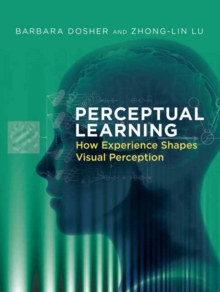Description
| Product ID: | 9780262044561 |
| Product Form: | Hardback |
| Country of Manufacture: | GB |
| Title: | Perceptual Learning |
| Authors: | Author: Barbara Dosher |
| Page Count: | 472 |
| Subjects: | Psychology, Psychology |
| Description: | Select Guide Rating A comprehensive and integrated introduction to the phenomena and theories of perceptual learning, focusing on the visual domain. Practice or training in perceptual tasks improves the quality of perceptual performance, often by a substantial amount. This improvement is called perceptual learning (in contrast to learning in the cognitive or motor domains), and it has become an active area of research of both theoretical and practical significance. This book offers a comprehensive introduction to the phenomena and theories of perceptual learning, focusing on the visual domain. This book is written for anyone who wants to understand the phenomena and theories of perceptual learning or to apply the technology of perceptual learning to the development of training methods and products. Our aim is to provide an introduction to those researchers and students just entering this exciting field, to provide a comprehensive and integrated treatment of the phenomena and the theories of perceptual learning for active perceptual learning researchers, and to describe and develop the basic techniques and principles for readers who want to successfully incorporate perceptual learning into applied developments. The book considers the special challenges of perceptual learning that balance the competing goals of system stability and system adaptability. It provides a systematic treatment of the major phenomena and models in perceptual learning, the determinants of successful learning and of specificity and transfer. The book provides a cohesive consideration of the broad range of perceptual learning through the theoretical framework of incremental learning of reweighting evidence that supports successful task performance. It provides a detailed analysis of the mechanisms by which perceptual learning improves perceptual limitations, the relationship of perceptual learning and the critical period of development, and the semi-supervised modes of learning that dominate perceptual learning. It considers limitations and constraints on learning multiple tasks and stimuli simultaneously, the implications of training at high or low levels of performance accuracy, and the importance of feedback to perceptual learning. The basis of perceptual learning in physiology is discussed along with the relationship of visual perceptual learning to learning in other sensory domains. The book considers the applications of perceptual learning in the development of expertise, in education and gaming, in training during development and aging, and applications to remediation of mental health and vision disorders. Finally, it applies the phenomena and models of perceptual learning to considerations of optimizing training. |
| Imprint Name: | MIT Press |
| Publisher Name: | MIT Press Ltd |
| Country of Publication: | GB |
| Publishing Date: | 2020-10-13 |


